Albania is a unitary parliamentary constitutional republic, where the President of Albania is the head of state and the Prime Minister of Albania the head of government in a multi-party system. The executive power is exercised by the Government and the Prime Minister with its Cabinet. Legislative power is vested in the Parliament of Albania. The judiciary is independent of the executive and the legislature. The political system of Albania is laid out in the 1998 constitution. The Parliament adopted the current constitution on 28 November 1998. Due to political instability, the country has had many constitutions during its history. Albania was initially constituted as a monarchy in 1913, briefly a republic in 1925, then it returned to a democratic monarchy in 1928. It later became a socialist republic until the restoration of capitalism and democracy in 1992.
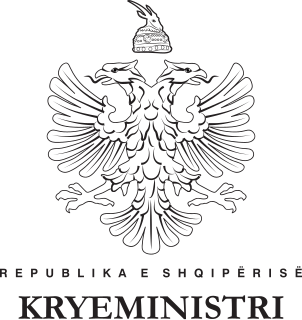
The Prime Minister of Albania, officially styled the Prime Minister of the Republic of Albania, is the head of government of the Republic of Albania and as well the most powerful and influential person in Albanian politics. The Prime Minister holds the executive power of the nation and represents the Council of Ministers and chairs its meetings.
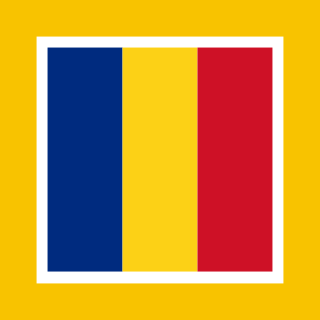
The Prime Minister of the Government of Romania is the head of the Government of Romania. Initially, the office was styled President of the Council of Ministers, when the term "Government" included more than the Cabinet, and the Cabinet was called The Council of Ministers. The title was officially changed to Prime Minister by the 1965 Constitution of Romania during the communist regime.
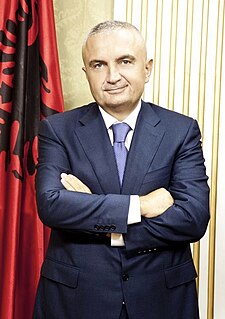
The President of Albania, officially styled the President of the Republic of Albania, is the head of state, commander-in-chief of the military and the representative of the unity of the Albanian people.

The President of Croatia, officially styled the President of the Republic, is the head of state, commander in-chief of the military and chief representative of the Republic of Croatia both within the country and abroad. The President is the holder of the highest office within the Croatia's order of precedence, however, the president is not the head of the executive branch as Croatia has a parliamentary system in which the holder of the post of Prime Minister is the most powerful person within the country's constitutional framework and within everyday's politics.

The Prime Minister of Vietnam, officially styled Prime Minister of the Government of the Socialist Republic, is the head of government of Vietnam who presides over the meetings of the Central Government. The prime minister directs the work of government members, and may propose deputy prime ministers to the National Assembly.
The Government of Croatia, formally the Government of the Republic of Croatia, commonly abbreviated to Croatian Government, is the main executive branch of government in Croatia. It is led by the President of the Government, informally abbreviated to premier or prime minister. The prime minister is nominated by the President of the Republic from among those candidates who enjoy majority support in the Croatian Parliament; the candidate is then chosen by the Parliament. There are 20 other government members, serving as deputy prime ministers, government ministers or both; they are chosen by the prime minister and confirmed by the Parliament (Sabor). The Government of the Republic of Croatia exercises its executive powers in conformity with the Croatian Constitution and legislation enacted by the Croatian Parliament. The current government is led by Prime Minister Andrej Plenković.

Ilir Meta is an Albanian diplomat and politician who has been serving as President of Albania since 24 July 2017. Previously he served as Prime Minister from 1999 to 2002, and at age 30 he is to date the youngest person to have been Prime Minister in Albanian history. Meta also served as Minister of Foreign Affairs from 2002 to 2003 and again from 2009 to 2010. He was Chairman of the Parliament of Albania from 2013 to 2017. Meta also held positions as Deputy Prime Minister and Minister of Economy, Trade, and Energy. Prior to that, he held the Chairmanship of the Parliamentary Commission of European Integration. Meta founded the Socialist Movement for Integration (LSI) in 2004.
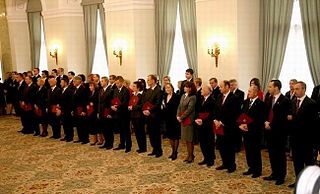
The Council of Ministers of the Republic of Poland is the collective executive decision-making body of the Polish government. The cabinet consists of the Prime Minister, also known as the President of the Council of Ministers, the Deputy Prime Minister, who acts as a vice-president of the council, and other ministers. The current competences and procedures of the cabinet are described between Articles 146 to 162 of the constitution.

The Parliament of Albania or Kuvendi is the unicameral representative body of the citizens of the Republic of Albania; it is Albania's legislature. The Parliament is composed of not less than 140 members elected to a four-year term on the basis of direct, universal, periodic and equal suffrage by secret ballot. The Parliament is presided over by a Speaker of the Parliament, who is assisted by at least one deputy speaker. The electoral system is based on party-list proportional representation. There are 12 multi-seat constituencies, corresponding to the country's administrative divisions.

The Prime Minister of North Macedonia, officially the President of the Government of the Republic of North Macedonia, is the head of government of North Macedonia. He or she is the leader of a political coalition in the North Macedonian parliament and the leader of the cabinet. The current Prime Minister is Zoran Zaev, who has served since 31 May 2017.
It is the fundamental law of the Republic of Albania. The present Constitution of Albania was adopted by the Parliament on 28 November 1998. It is split up over many different acts. The document succeeded the 1976 Constitution, originally adopted at the creation of the People's Socialist Republic of Albania on 28 December 1976 and heavily amended on 29 April 1991.
The Cabinet of Sri Lanka is the council of ministers that form the central government of Sri Lanka. It is responsible to and answerable to parliament. The current cabinet is the Sirisena cabinet.
The Government of the Slovak Republic is the head of the executive branch of state in Slovakia.
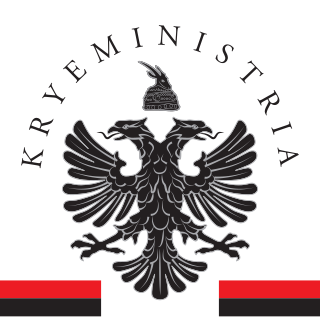
The Council of Ministers is the executive branch that constitutes the Government of Albania. The Council is led by the Prime Minister of Albania. The prime minister is nominated by the President from among those candidates, who enjoy majority support in the Parliament; the candidate is then chosen by the Parliament. In the absence of the prime minister, the Deputy Prime Minister takes over his functions. There are 19 other government members, serving as deputy prime ministers, government ministers or both; they are chosen by the prime minister and confirmed by the Parliament.
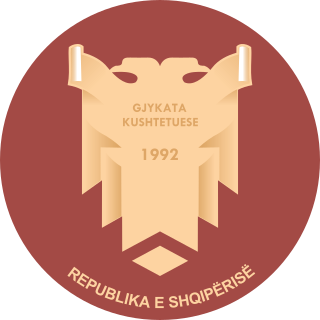
The Constitutional Court of the Republic of Albania is the final authority for the interpretation of the Constitution (Kushtetuta) and the compliance of laws in accordance with the constitution. As of article 168, the ourt guarantees respect for the Constitution and makes final interpretations of it.
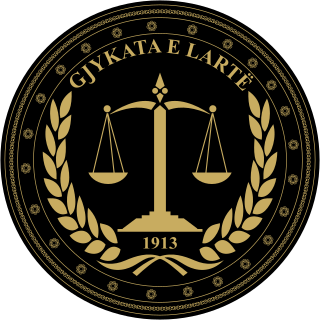
The Supreme Court of the Republic of Albania is the highest court of Albania and is the final court of appeal in the judicial system of Albania. It is composed of seventeen judges, the Chief Justice and sixteen Members.

The Chief of the General Staff is the chief of the General Staff and Albanian Armed Forces. The chief of staff is appointed by the President of Albania, who is the commander-in-chief. The position dates back to the Provisional Government of Albania. The current Chief of the General Staff is Brigadier General Bardhyl Kollçaku
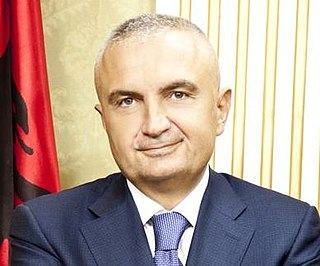
Indirect presidential elections were held in Albania on 19, 20, 27 and 28 April 2017, the eighth such elections since the collapse of the communist regime in 1991. In the first through third round, no candidates were proposed and no vote took place in the Parliament of Albania. In the fourth round, the incumbent Chairperson and then-Prime Minister of Albania, Ilir Meta was elected as the eighth President of Albania with almost 87 votes.

The Council of Ministers of Lebanon is the executive body of the Republic of Lebanon. Its president is the Prime Minister of Lebanon, and it appointed by the President of Lebanon with confirmation of the Parliament of Lebanon. It is generally equally composed of Muslims and Christians. The Council of Ministers is considered to be the "government" of Lebanon by the Constitution.

















